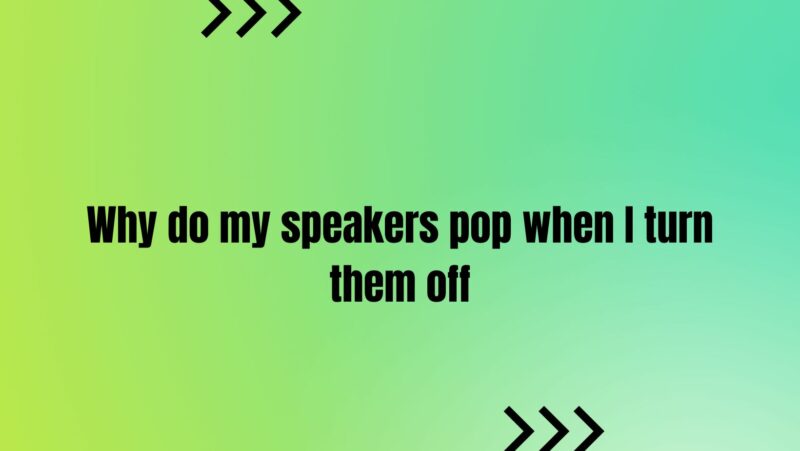The world of audio is a realm where emotions are woven into melodies and harmonies, creating an immersive experience for listeners. However, the enchanting journey through sound can sometimes be punctuated by a perplexing phenomenon: speaker popping during shutdown. The abrupt and unexpected sound emitted by speakers when they are turned off has left many audiophiles and enthusiasts puzzled. This article delves into the intricacies of why speakers pop during shutdown, explores the underlying mechanisms, and provides insights into strategies to minimize or eliminate this audible occurrence.
Decoding the Speaker Popping Phenomenon
The phenomenon of speaker popping during shutdown is characterized by a sudden and distinct popping or clicking sound that emanates from the speakers as they are powered down. This sound can be startling and concerning, particularly given the desire for smooth transitions in the audio experience. To understand why speakers pop during shutdown, it’s essential to unravel the intricacies of the speaker’s behavior as it reacts to changes in power flow.
Root Causes of Speaker Popping During Shutdown
- Voltage Discharge: When an amplifier is turned off, the voltage supplied to the speakers is abruptly cut off. This sudden reduction in voltage can cause the speaker’s diaphragm to move rapidly, resulting in the popping sound.
- Capacitor Discharge: Amplifiers often utilize capacitors to store electrical energy. During shutdown, the discharge of stored energy in these capacitors can generate a popping noise as the speakers react to the sudden change in voltage.
- Magnetization Reversal: The voice coil and magnet assembly in a speaker can experience changes in magnetic fields during shutdown, leading to mechanical movement of the diaphragm and the associated popping sound.
- Crossover Component Interaction: In multi-driver speaker systems with crossovers, components like inductors and capacitors can interact in unexpected ways during shutdown, leading to voltage spikes and associated pops.
- Audio Signal Residue: In some cases, a small amount of audio signal residue might linger in the amplifier’s circuitry even after it’s turned off. This residual signal can lead to a brief burst of sound as the speakers react to the remaining signal.
Strategies to Minimize or Eliminate Speaker Popping
- Soft Muting Circuitry: Some amplifiers incorporate soft muting circuitry that gradually reduces the audio signal to the speakers during shutdown. This gradual reduction minimizes the abrupt voltage changes that cause popping.
- Power Sequencing: If you have multiple audio components, consider using a power sequencer to control the order in which components are powered off. This can help prevent abrupt voltage changes that lead to speaker popping.
- Amplifier Power-Off Delay: Implement a brief delay between turning off the amplifier and cutting off power to the speakers. This delay allows the amplifier to stabilize before the speakers are powered down.
- External Muting Devices: Some external devices, such as muting controllers or power conditioners, can be added to your audio setup to manage the power-down process and minimize popping.
- Active Speaker Control: If you’re using active speakers (with built-in amplification), certain models include automatic muting circuitry that minimizes or eliminates popping during shutdown.
- Speaker Protection Relays: Consider using speaker protection relays that gradually disconnect the speakers from the amplifier as it’s powered down, preventing sudden voltage changes.
- Amp Standby Mode: If your amplifier has a standby mode, consider using it when you’re not actively using the speakers. Standby mode keeps the amplifier on with reduced power, minimizing voltage fluctuations during shutdown.
- Component Inspection: If speaker popping is persistent and bothersome, consult a professional technician to inspect the amplifier, speakers, and associated components for potential issues.
Preventive Measures
- Manufacturer Guidelines: Refer to the manufacturer’s recommendations for powering down your amplifier and speakers. Following these guidelines can help minimize the risk of popping.
- Speaker Handling: Gently power down your speakers and avoid abrupt shutdowns to minimize the likelihood of sudden voltage changes that cause popping.
- Speaker Warm-Up and Cool-Down: Consider gradually warming up and cooling down your speakers by playing low-level audio for a short period before shutting them down. This can help stabilize components.
- Audio Signal Reduction: If possible, lower the volume before shutting down the amplifier. This reduces the amplitude of the residual audio signal that can lead to popping.
Conclusion
The enigmatic sound of speaker popping during shutdown has intrigued and puzzled audio enthusiasts and musicians alike. While this phenomenon might appear counterintuitive to the seamless audio experience we crave, understanding its root causes empowers us to explore effective strategies for minimizing or eliminating it.
Whether through the implementation of soft muting circuitry, strategic power sequencing, or gradual power-off delays, solutions exist to ensure that the act of powering down your speakers is as melodious as the sound they produce. By embracing a combination of technical knowledge, thoughtful equipment handling, and prudent maintenance practices, you can usher in a harmonious conclusion to your audio sessions, free from the unexpected punctuation of speaker popping.


